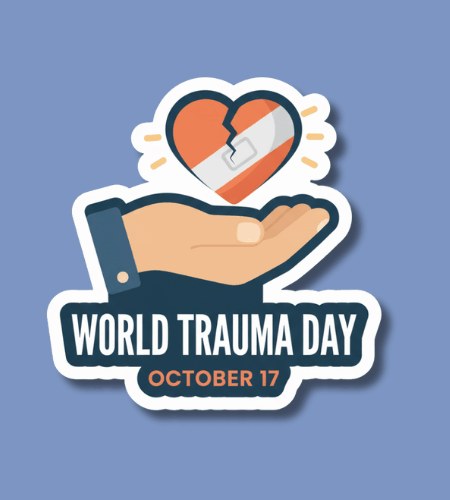The World Trauma Day is observed every year on 17 October, and it serves as a global reminder of the serious consequences of traumatic injuries and the importance of fast, skilled medical intervention. Whether caused by road accidents, falls, violence, or natural disasters, trauma continues to claim countless lives and alter futures—especially in areas where emergency care is lacking. This day is a call to action to raise awareness, improve trauma care systems, and promote a culture of prevention and preparedness in every part of the world.
Table of Contents
History of World Trauma Day
World Trauma Day was launched in 2011 in New Delhi, India, in response to the rising number of deaths and disabilities resulting from trauma, especially traffic accidents. India, with one of the highest rates of road injuries globally, was a fitting place to initiate a movement focused on improving emergency response and educating the public about trauma care. The campaign aimed to bring public and medical attention to trauma as a leading yet often overlooked cause of death and disability.
Since then, World Trauma Day has spread across continents, with hospitals, universities, NGOs, and local governments marking the day through training sessions, awareness campaigns, and media outreach. The focus is not only on treating trauma but also on building resilient systems that can respond effectively—through education, investment in emergency infrastructure, and better mental health support for survivors.
Why World Trauma Day is important
Trauma is a silent crisis. Unlike diseases that come with warning signs or preventive treatments, trauma strikes suddenly. A car crash, a workplace injury, a violent assault—these are events that can transform lives in seconds. The difference between life and death often depends on how quickly and effectively help arrives. That’s why this day exists—to stress the importance of training first responders, equipping hospitals, and educating the public.
Another reason this day is so meaningful is because trauma doesn’t end when the bleeding stops. Many survivors live with chronic pain, disability, or psychological wounds like PTSD. We’re slowly recognizing that trauma care must include long-term recovery—rehabilitation, mental health support, and social reintegration. World Trauma Day brings all these threads together: emergency response, ongoing care, and survivor dignity.
Here’s why it matters to many people:
- It stresses how time and knowledge can save lives in trauma cases
- It focuses attention on countries and areas without strong emergency systems
- It encourages first aid education at a community level
- It reminds us that trauma includes psychological pain, not just physical injury
- It creates space for survivors and caregivers to be heard
How to Observe World Trauma Day
This is a day best observed through learning and action. You could start by attending or organizing a local first aid class—many communities offer free or low-cost sessions. It’s a skill that could save someone’s life. Another great way to participate is by helping raise awareness, whether through social media posts about trauma prevention tips, or by sharing stories of recovery and strength.
If you’re part of a school, office, or community group, you might host a small awareness event—a talk by a paramedic, a basic training in emergency response, or even just distributing flyers. On a more personal level, check in on someone you know who’s experienced trauma, offer support, or encourage them to speak if they’re ready. You don’t need to be a doctor to be helpful—just human.
Some easy, meaningful ways to mark the day:
- Take or host a basic first aid or CPR course
- Post trauma awareness tips on social media
- Organize a talk or info session at school or work
- Support a local trauma hospital or charity
- Reach out to someone going through recovery and just listen
World Trauma Day Dates Table
| Year | Date | Day |
|---|---|---|
| 2026 | October 17 | Saturday |
| 2027 | October 17 | Sunday |
| 2028 | October 17 | Tuesday |
| 2029 | October 17 | Wednesday |
| 2030 | October 17 | Thursday |
Subscribe to our newsletter and never miss a holiday again!

